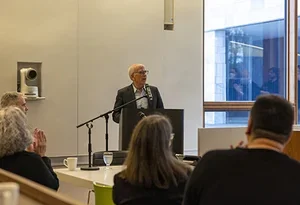Local Concerns Took Center Stage at U.S. Senator Peter Welch’s Town Hall Meeting
The Center for the Advancement of Public Action (CAPA) Symposium was filled to capacity with Bennington-area residents eager to ask questions about how the federal government can make an impact on the local issues that matter most to them.

On the evening of Tuesday, April 4, 2023, U.S. Senator Peter Welch gathered a large crowd in the Symposium of the Elizabeth Coleman Center for the Advancement of Public Action (CAPA) on Bennington College’s campus.
Welch began his remarks with the trauma of having been in the Capitol Building during the January 6 insurrection and his dismay as some of his colleagues, having returned from evacuation at 3 am to fulfill the functional responsibility of certifying the votes in the presidential election, voted not to.
“Our work now is to make sure that we protect that democracy,” Welch said. “It is the tool we need to resolve really challenging conflicts.” He continued, “It’s the work of democracy to give a seat at the table to everyone who is going to be affected, so they can have a voice in what the decisions are, and there can be an ongoing conversation about what changes we have to make.”
Moderator State Senator Brian Campion opened with a request that Senator Welch comment on the indictment of former President Trump, which had happened earlier in the day.
“It’s a very sad day in our country,” Welch said, referring to the unprecedented nature of the event. “There’s also the principle that all of us know is essential, that is nobody is above the law.”
During the question and answer portion, which represented the majority of the one-hour program, attendees raised concerns about school infrastructure and school safety, tax rates for retirees, the opioid crisis and associated gun violence, inflation, and risks associated with toxic and explosive substances stored in parked railway cars. Others asked about governmental dysfunction, health care and the ongoing pandemic, racial injustice and policing, climate change, the recent overturning of Roe vs. Wade, and worries about other rights that may be at risk in the hands of the current Supreme Court.
Welch empathized with and affirmed each question-asker and noted his own frustrations with eroding regulation, campaign finance, and judicial activism.
Among the challenges, Welch noted that the House of Representatives is embroiled in “culture wars that just never stops.” He shared how the House seems to believe that they can, “can cut the Federal budget by seventy percent, and it won’t make an impact on local communities.”
Welch also highlighted some wins, like bringing loyal Afghan interpreters safely to the United states and winning $500 billion to stimulate a market dynamic in the fight against climate change, “which is essential, so we can bring the cost of decarbonization down, so it’s affordable to everyday people,” Welch said.
When Bennington College student Mattias Van Cleef ’25 expressed the younger generation’s exhaustion and their dwindling will to continue fighting the injustices they see around them, Welch responded with empathy and a pep talk.
“I listen to the situation that you face—it’s accurate, and I really respect it—there’s a question that I can’t answer but only you can answer,” Welch said. “How can you act in ways that make you feel like a good whole productive contributing person, acknowledging that, like you said, the odds are against you, against us?”
Welch emphasized continued participation in the political process, helping others, “even at the micro level,” and celebrating small wins in the face of daunting challenges in every area of American life.
“You embrace the agency you have as an individual to make a difference, even if it is just for a next door neighbor, a little brother or sister, or a classmate,” Welch said. “There’s some joy in doing that.”